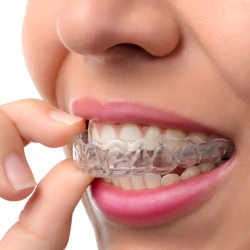Denture Repairs: Why a Proactive Attitude Is the Secret to a Long-Lasting Restoration

Dentures have been a reliable restoration for several years now. They can help patients at all levels of tooth loss, they’re quick to produce, and they’re more affordable than other options. If costs or time are a concern for you, your dental Fort Walton Beach office may suggest them as the perfect treatment option.
However, when getting dentures, understanding the need for repairs is key to making them last. By knowing what to expect and when your denture may start to feel uncomfortable, you can schedule prompt repairs and prevent hurting both your restoration and your mouth.

How Long Do Dentures Last?
Dentures are a long-lasting and durable restoration, lasting between 5 and 10 years. Our mouth's chewing forces (known as masticatory force) can be surprisingly high. While normal chewing ranges between 16 and 34 pounds, when biting down with maximum effort—or on a particularly tough food—forces can increase to 101 to 174 pounds.
Dentures are designed to withstand these chewing forces while remaining comfortable and adaptable to a patient's mouth. However, constant exposure to the mandible’s wear and tear and failure to follow denture care habits can progressively damage your dental restoration.
Moreover, even with the best care, dentures tend to become uncomfortable because your jawbone shape changes as you age. Dental professionals can identify this and modify the denture’s base so that it fits perfectly once again—but to do so, a repair is necessary.
Failure to repair damaged or uncomfortable dentures in time can have several consequences for your oral health and your restoration’s lifespan. Some of these include:
- Damaged or poorly fitting dentures can cause sore spots and gum irritation, leading to pain and discomfort over time.
- It is difficult to chew food and speak clearly with ill-fitting, cracked, or broken dentures.
- Often, denture problems start small but exacerbate over time. For example, a small crack can become deeper, compromising the structural integrity of the denture and requiring more extensive—and costlier—repairs.
- Ill-fitting or damaged dentures tend to exert uneven pressure on the gum tissues, which can be irritating. If unaddressed, this leads to an increased risk of infections that can even cause bone resorption.
- If dentures are not fixed immediately and their fit deteriorates, facial muscle sagging and a prematurely aged appearance may result.
- Damaged dentures make it difficult to eat certain foods. Over time, this can lead to a poor diet and nutritional deficiencies.
- Besides dietary issues, ill-fitting or visibly damaged dentures can affect self-confidence and may lead to social embarrassment or withdrawal from social situations.
- Improper denture fit can cause your bite to be out of alignment, leading to temporomandibular joint (TMJ) problems and jaw pain.
Types of Denture Repairs
Depending on the degree of damage, some broken dentures can be repaired. The restorations can be done by dentists or sent to dental labs when they require more time and effort.
There are various kinds of repairs for dentures, depending on how they break:
1. Denture Reline
With a denture reline, the side of your denture that comes into contact with your mouth's soft tissues is repaired or replaced. This improves the comfort of the dentures' fit.
Relines are often necessary when the precise fit of the dentures changes. This is caused by dental tissue or bone changes, especially as you age, so you should reline your dentures once every six years.
Among the varieties of denture relines are:
- A hard reline involves resurfacing the acrylic lining for a better fit. The repair can last several years.
- A soft reline uses pliable materials like rubber gums or wax for improved comfort. However, this material may need to be replaced more frequently because it's more prone to plaque and stains.
- Temporary relining is a short-term fix for sore gums caused by neglected denture care. It involves using a medicated conditioner before a permanent fix, such as new dentures or a hard reline.
2. Denture Rebase
With a denture rebase, the pink acrylic portion of your denture that holds your teeth in place is recreated. If all of your denture's teeth are in good condition but the pink acrylic has deteriorated, your dentist may suggest this repair. A dental lab usually performs this.
It’s only performed for complete dentures, though, not partials.
3. Denture Adjustment
A denture adjustment removes the acrylic to make the dentures more comfortable in your mouth. Dentists can complete the procedure in their offices rather quickly.
4. Denture Replacement
Your dentures may need to be replaced if they become irreparable or no longer function for you. The process of replacing a denture is comparable to receiving your first set.

Can I Perform DIY Fixes?
Dentists strongly advise against repairing dentures at home with do-it-yourself denture repair kits. Doing so may cause more damage to your dentures, and the cost of repair may go up.
Additionally, it can damage your oral health, as the adhesives are toxic to humans.
Why Regular Dental Visits Are Still Important for Denture Wearers
Denture wearers often fail to attend regular dental visits, thinking that there's nothing to see because they don’t have any teeth left. However, this is far from the truth.
For starters, even without teeth, you can develop oral issues like gum disease, which causes discomfort and may impact your denture’s precise fit over time. Additionally, denture-wearers are encouraged to bring their prosthetics during a dental visit so that we can assess their state and ensure there’s no noticeable damage.
Small cracks and even tooth fractures can be restored and replaced when identified early on. So, don’t skip regular check-ups, and let a dental professional ensure your dental restoration is in top shape!

Find a Dental Fort Walton Beach Office That Offers Denture Repairs
Denture repair may be necessary for several reasons. Dentures may need to be adjusted over time. Additionally, wear and tear can impact your denture’s functionality. Taking quick action to fix any problems you find will help your beloved prosthetics last longer.
The staff at Dr. Tony Clark can keep your dentures safe, comfortable, and functional by addressing minor issues before they become more serious. Make an appointment for a checkup with us right now, and together, we can prevent any possible denture problems!







